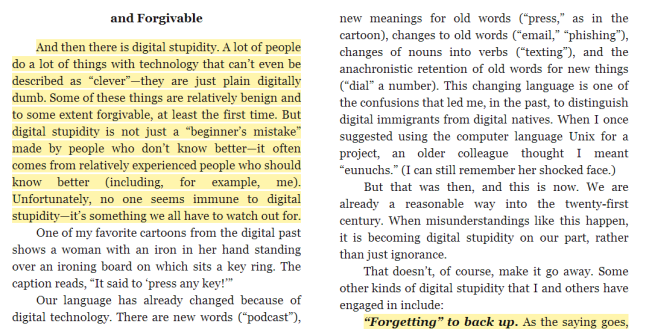In the book, The Shallows: What the Internet is Doing to our Brain, I LOVE how Carr always gives us a historical progression of technology. I particularly found chapter 4 in the book so interesting! I love reading about how people originally wrote on anything they could scratch symbols onto and how the development of different writing mediums changed over time. What makes the chapter even more intriguing was reading specific quotes or feelings of people during the time of change when writing became easier and more personal. This quote by Isaac of Syria is AWESOME; it is exactly how I feel when I get lost in a good book.
On the flip side, as Carr progresses through describing how printing became easier and how much more accessible the written word became to people; there was a lot of “low-minded” publications that were being printed. Such as, gutter journalism, propaganda and pornography.
This for me connected to what Prensky wrote about in chapter four of his book, Brain Gain. Although he did not make the connection I am about to explicitly, I see one. Prensky refers to the idea of being digitally wise vs. being digitally dumb. He describes a criterion for being digitally wise in the screenshot below:
He describes being digitally dumb or stupid as something that most people do at some point, but we should know better to avoid that action. In the screenshot below is his explanation of digitally stupid and one example that resonated with me. In fact, he is pointing out to me that I am REALLY digitally stupid, because I had that exact same scenario where I lost all of my lesson plans and assignments etc. from 6 years of teaching, and I still have not backed up the computer I have been using for the last two years!! (And I consider myself intelligent and not among the “old” people who just don’t know better).
I also think that being digitally dumb can be compared to using technology for dumb things, like Facebook could be digitally dumb. Prensky refers to how it can be digitally benign or digitally clever, but it can also be digitally dumb. I have seen posts by people that seem so ridiculous to me that anyone would even think about posting and sharing that information. One post I saw once was by a girl who is 24 years old and she posted how she cut herself shaving so she felt like she was 13 again. Really? Who wants to read that? Those kinds of posts and shares seem to me to be a digitally dumb way to use a social networking site.
On that note though, just like when the printed word became a mass phenomenon and it is and was totally worth the “low-minded” stuff that went with it, I think that that it is worth us taking the digitally dumb in order to have the technology and become digitally wise or digitally clever. The technology does push us forward; it is a matter of how we use it and how we teach our children/students to use it.
—-I have continued using the computer to read the two books. I don’t really enjoy reading on the computer. It makes it feel too much like I am reading because I have to, not because I want to. And I am actually enjoying the two books for class, so it is sort of disappointing to me to be reading on the computer. I also have a hard time not being able to flip through the book to see where I am in a chapter. Instead I have to scroll through the pages and then go back to where I was. Since the pages are not numbered, if I don’t remember to click on the page I am on to see the page number, I have to spend extra time reading parts of each page to find where I left off. The thing is though, if our students are introduced to reading on the computer or an iPad earlier on, they probably won’t feel a lot of the frustrations that I feel.
Carr, N. G. (2010). The shallows: What the Internet is doing to our brains. New York: W.W. Norton. (Kindle)
Prensky, M. (2012). Brain gain: Technology and the quest for digital wisdom. Basingstoke: Palgrave Macmillan. (Kindle)






